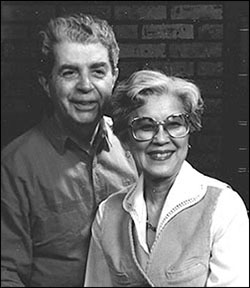
Aiko Yoshinaga (later changed to Herzig-Yoshinaga) was born in 1924 in Sacramento but grew up in Los Angeles. At the outset of World War II, she and her family were imprisoned in three War Relocation Authority-administered camps of Manzanar, California; Jerome, Arkansas; and Rohwer, Arkansas. Following WWII, she spent five years in Japan before returning to the United States and settling in New York City. In the 1950s, she was involved with a variety of human and civil rights organizations, and participated in community demonstrations as a member of Asian Americans for Action (often referred to as Triple A), one of the very first East Coast Asian American grassroots community organizations to join the fight for civil rights.
John A. "Jack" Herzig was born in New Jersey in 1922. Jack was attending Long Island University in New York when World War II broke out, at which time he was drafted out of the National Guard as a reserve. He volunteered to participate in a paratrooper unit, and after basic training, he joined the 503rd Parachute Regimental Combat Team as a combat paratrooper. He was honorably discharged on Aug. 6, 1945, the day the United States government dropped the atomic bomb on Hiroshima. Jack returned to civilian life and resumed his education at New York University but was recalled-to duty at the start of the Korean War. For the next 27 years he continued to work for the military and was honorably discharged as a lieutenant colonel. He then worked at various governmental agencies in Virginia, Maryland and Washington D.C., including the Department of Defense as a counterintelligence expert, before joining Public Technology, Inc., a non-profit organization. In 1977, he was awarded a Conspicuous Service Cross medal by the State of New York. John 'Jack' Herzig died in Gardena, California, on August 21, 2005.
Jack and Aiko Herzig played a pivotal role in the redress movement through their research at the National Archives and many other repositories across the nation. The documents they compiled proved to be instrumental in the WWII Supreme Court coram nobis litigation cases that vacated the wartime convictions of Fred Korematsu and Gordon Hirabayashi. They conducted primary research of official documents for the National Council for Japanese American Redress in the class action lawsuit, William Hohri et al., vs. USA. Herzig-Yoshinaga also worked with the Department of Justice Office of Redress Administration to assist with and verify eligibility of individuals from the Nikkei community eligible for both redress compensation and formal legislative letter of apology.
In 1978, Jack and Aiko Herzig were married and moved to Washington, D.C. With a project that started as personal research for Herzig-Yoshinaga, Jack and Aiko Herzig began examining documents related to the WWII incarceration of Japanese Americans at the National Archives and Records Administration. In the years to follow, their research evolved into a larger effort with expanded scope. Herzig-Yoshinaga joined the National Council for Japanese American Redress (NCJAR) in 1980 (the same year the Commission on Wartime Relocation and Internment of Civilians (CWRIC) was created) and contributed her compiled body of research to NCJAR's class-action lawsuit seeking reparations from the government. The following year, in 1981, she was hired by the CWRIC as its lead researcher. During this time, they discovered the only surviving draft of the Western Defense Command's Final Report: Japanese Evacuation from the West Coast 1942, also known as DeWitt's suppressed version; this was to become the 'smoking gun' piece of evidence for the coram nobis court case for redress.
Extensive research provided both Aiko and Jack Herzig with expertise needed in the Japanese American community. Jack Herzig testified as an expert witness in the evidentiary hearing for a writ of error coram nobis in Hirabayashi v. the United States (1985) that helped vacate the wartime Supreme Court convictions of Gordon Hirabayashi, Fred Korematsu and Minoru Yasui. The couple also provided evidentiary documents in the near-success of the class action lawsuit filed against the U.S. government by the National Council for Japanese American Redress, among others. Jack Herzig also testified before Congressional subcommittees that the MAGIC Cable intercepts were not proof of Japanese American disloyalty before the war. Additionally with the passage of the Civil Liberties Act of 1988, Herzig-Yoshinaga (with the assistance of Jack Herzig) was hired by the Department of Justice to conduct research for the Office of Redress Administration to identify Japanese Americans eligible for reparations and a formal Presidential letter of apology.
Over the years, the Herzigs continued to offer research assistance to the general public and served as consultants for the Smithsonian lnstitute's exhibit "A More Perfect Union." Together they received many honors for their work.
Aiko Herzig-Yoshinaga has personally published the monograph, "Words Can Lie or Clarify: Terminology of the World War II Incarceration of Japanese Americans." Additionally she was principal editor of the publication, Speaking Out for Personal Justice, co-edited with Marjorie Lee, and funded by a grant from the Civil Liberties Public Education Fund.
